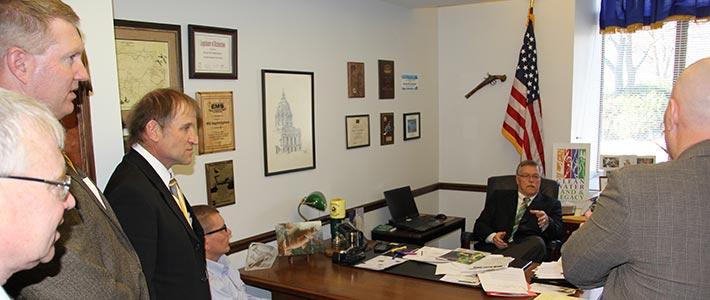One doesn’t have to look very hard at trade agreements like the Trans Pacific Partnership (TPP) to realize the complexity and lack of clarification. TPP is a difficult and at times contentious subject. As farmers, the TPP is a valuable tool to help us sell our product to new and emerging markets.
When we talk about the Minnesota Soybean Growers Association (MSGA), it’s easy to overlook the work of your farmer leaders in Washington, D.C. and beyond because they are doing great work for you in St. Paul. Yet MSGA has American Soybean Association directors serving on behalf of Minnesota soybean farmers for policy that positively impacts our farm.
And when we have subjects as difficult as TPP, you have farmer leaders dedicated to dissecting and analyzing the hustle and bustle of D.C.
Some criticize TPP because it interacts with the free-market system on a very open platform. However, the important thing to understand is U.S. farmers stand to benefit from TPP, especially in the livestock sector. The 11 partners of TPP represent roughly 500 million potential customers and more than 40 percent of the global economy.
TPP helps to distribute some wealth to those countries. This is important because as people in those markets have more money, they will want better quality, protein-rich food. If those countries import U.S. meat, farmers benefit because our No. 1 customer, livestock, benefits. If we export whole soybeans, soybean oil or soybean meal, even better.
Recently, our partners and friends at the Minnesota Soybean Research & Promotion Council hosted a See For Yourself mission to Vietnam. They learned that people in Vietnam spend nearly 65 percent of their income on food. They also learned that in a country of nearly 94 million people, the middle and affluent class make up 45 percent of the population, and that class is searching for protein-rich food options.
They also answered questions from businessmen and women about TPP. Ratification was very important to the customers we met, and the delegation learned firsthand how TPP would be a big boost to their economy, which in turn has the ability to impact our economy.
TPP, if approved, will eliminate tariffs on soybeans, soybean oil and soybean meal in each of the 12 TPP nations within a set timeframe. The 11 nations joining the U.S. are Japan, Chile, Canada, Mexico, Peru, Australia, New Zealand, Singapore, Brunei, Malaysia and Vietnam.
During this election year you will likely hear a lot about TPP. Don’t expect the current presidential candidates to have kind words — they are seeking votes. But don’t turn a blind eye toward it either.
Let’s keep the pressure on Congress to take up and approve the TPP agreement as quickly as possible. The more markets we have to sell our soybeans in, the better, and TPP is an avenue toward doing so.
Tags: Trans-Pacific Partnership




